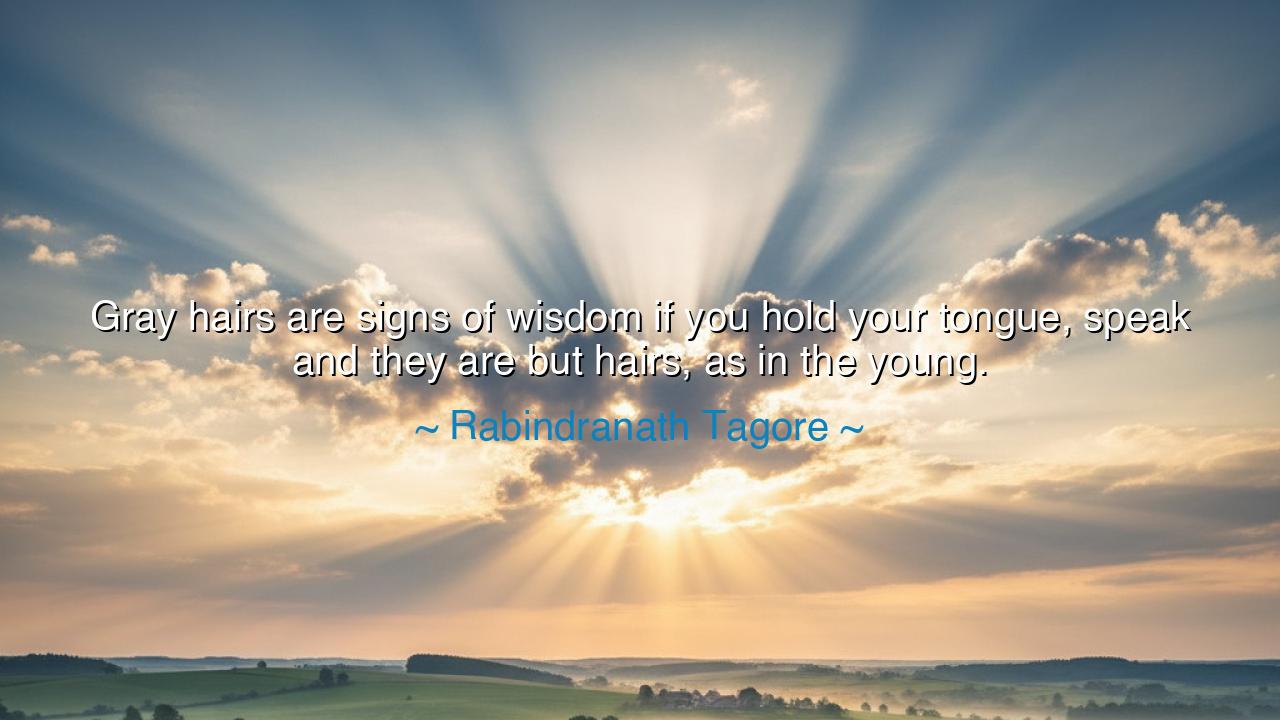
Gray hairs are signs of wisdom if you hold your tongue, speak
Gray hairs are signs of wisdom if you hold your tongue, speak and they are but hairs, as in the young.






The poet-sage Rabindranath Tagore, voice of Bengal and seer of the human soul, once declared: “Gray hairs are signs of wisdom if you hold your tongue, speak and they are but hairs, as in the young.” In this saying, he unveils a profound truth: that age alone does not bestow wisdom. Gray hairs may proclaim the passage of years, but unless they are matched with humility, restraint, and discernment, they signify nothing more than the fading of youth. To speak without thought is to prove that age has brought no growth, no refinement of spirit.
The origin of this wisdom lies in Tagore’s reflections on human character, in a land where reverence for elders was great, yet where he saw that reverence must be earned, not assumed. For it is not time that sanctifies a man, but the use of time. Silence, when chosen with wisdom, becomes the adornment of the aged, transforming gray hairs into a crown of honor. But idle speech, foolish or vain, strips them of dignity, reducing the elder to the level of the untested youth.
History confirms this in the life of King Lear, who, though aged and crowned with white hair, cast away his kingdom in folly by heeding flattery over truth. His years might have promised wisdom, but his words revealed blindness and pride. By contrast, the aged Nestor of Homer’s epics, who spoke sparingly yet with measured weight, turned his years into a reservoir of counsel. Thus Tagore reminds us that the power of age lies not in appearance, but in the tongue restrained and the heart disciplined.
The ancients themselves honored this principle. The Proverbs declared, “Even a fool is thought wise if he keeps silent.” The Stoics taught that mastery of the tongue was greater than mastery of nations. For what use is experience if it cannot teach discernment, and what is age without self-control? The truly wise elder speaks little, but when he does, his words carry the strength of mountains and the clarity of rivers.
Therefore, O seekers of tomorrow, learn from this: let your gray hairs—whether literal or symbolic—be crowns not of vanity but of wisdom. Hold your tongue when silence is nobler than speech, and when you do speak, let your words be few but radiant with truth. For time will mark your body whether you will it or not, but only discipline of the spirit will make you honored in the eyes of others. Age does not guarantee wisdom; only humility, patience, and restraint can.






TANguyen Tuan Anh
Tagore’s reflection on gray hairs being a sign of wisdom through silence is thought-provoking. But does this mean older people should always be quiet to show their wisdom, or is it about knowing the right time to speak? Can speaking with experience and insight also demonstrate wisdom, or does wisdom lie in choosing to speak only when necessary? I feel like wisdom must be about balance, not just silence.
ALAnh Le
I love the depth in Tagore’s quote. He suggests that the value of gray hairs comes not just from age but from the ability to control one’s speech. But does that mean that younger people who may not have gray hairs but practice restraint could be just as wise? It makes me wonder if wisdom truly is a product of age, or if it's more about personal growth and the ability to choose the right moments to act.
TNNguyen Thi Thanh Nga
This quote from Tagore makes me think about how society often equates age with wisdom, but Tagore adds a twist with the idea of holding one’s tongue. I wonder, though, is it possible for someone to be wise and speak out, or does true wisdom come from knowing when to stay silent? In a world where speaking up is encouraged, how do we figure out when it’s more prudent to listen rather than talk?
KTle ngoc khanh tran
Tagore’s quote resonates with me, especially as I think about the connection between age and wisdom. There’s something so powerful about the idea that silence, especially when you’ve lived a long life, holds value. But how do we balance the wisdom of silence with the need to speak up and share our knowledge? Can holding your tongue sometimes be a form of avoiding responsibility, or is it an act of wisdom in itself?
TUnguyen thu uyen
I really appreciate Tagore’s insight on gray hairs representing wisdom. It feels like he’s suggesting that wisdom comes not just with age, but with restraint and thoughtfulness. But does that mean every older person is automatically wise, or is wisdom something that has to be actively cultivated? I wonder if people can gain wisdom even without holding their tongue or if speaking out at the right moments also reflects wisdom.